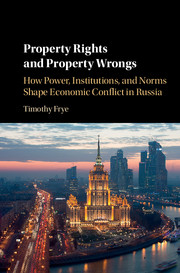 Property Rights and Property Wrongs
Property Rights and Property Wrongs Book contents
- Frontmatter
- Contents
- List of figures
- List of tables
- Acknowledgments
- Note on the text
- 1 Introduction
- 2 Power and Property
- 3 Autocratic Elections and Property Rights
- 4 Courts and Connections
- 5 Reputation and the Rule of Law
- 6 Social Norms and the Banker's Gold Watch
- 7 Conclusion
- Data Appendix
- References
- Index
3 - Autocratic Elections and Property Rights
Published online by Cambridge University Press: 31 March 2017
- Frontmatter
- Contents
- List of figures
- List of tables
- Acknowledgments
- Note on the text
- 1 Introduction
- 2 Power and Property
- 3 Autocratic Elections and Property Rights
- 4 Courts and Connections
- 5 Reputation and the Rule of Law
- 6 Social Norms and the Banker's Gold Watch
- 7 Conclusion
- Data Appendix
- References
- Index
Summary
Yes, as through this world I've wandered
I've seen lots of funny men
Some will rob you with a six-gun
And some with a fountain pen.
Woody Guthrie, The Tale of Pretty Boy FloydHostile corporate raiding in Russia suggests an addendum to Woody Guthrie's categories of theft: Some men will rob with you a six-gun and with a fountain pen. Rather than simply stealing a factory via armed seizure or taking control via a legal purchase of shares in a market, corporate raiders in Russia typically rely on some mixture of the two. Indeed, it is the union of threats of coercion and the use of formal legal institutions, courtrooms, share registries, and state regulatory bodies that make hostile corporate takeovers in Russia so worthy of investigation. Raiders may take physical control of a factory, but their rights are greatly enhanced via documentation of formal transfer of the rights from the raided to the raider.
The previous chapter helped to untangle the relationship between bargaining power and property rights at least as measured by the likelihood of a hostile corporate takeover. Managers of larger firms, private firms, and firms with more mobile assets saw their property rights as more secure from a hostile corporate takeover, while managers without personal connections to the governor were far less sanguine about this prospect. The strategy in the prior chapter was to hold constant the bargaining power of the ruler while exploring variations in the amount and types of power held by the right-holder. By unpacking political power and political connections into more discrete components, the last chapter aimed to provide a more nuanced treatment of the impacts of power on perceptions of property rights.
This chapter adopts a different strategy by taking advantage of an exogenous shift in the bargaining power of the ruler – the unexpectedly poor performance of the ruling United Russia party in the December 2011 parliamentary elections – and traces how it shaped the perceptions of right-holders about the likelihood of a hostile corporate takeover.
Fortunately, in the survey analyzed in the preceding chapter, about half of the firm managers were interviewed just prior to the elections and half the managers were interviewed just after the elections.
- Type
- Chapter
- Information
- Property Rights and Property WrongsHow Power, Institutions, and Norms Shape Economic Conflict in Russia, pp. 82 - 100Publisher: Cambridge University PressPrint publication year: 2017


